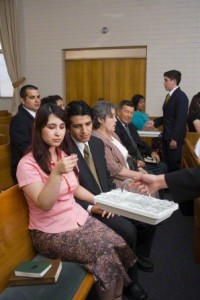In this third installment on the topic of grace, we will finish up with the questions regarding it. In the first two parts, we talked about what grace is; where it comes from; and how it fits with the Atonement, justification, and sanctification, and so forth. The last question in this discussion (How do I receive the gift of grace?) acts as the summary of all the other questions we’ve discussed on the topic of grace. You can get to the first set of questions by clicking here, and to the second set of questions by clicking here.
Is grace truly free or are there obligations that go with it?
This is a trick question, since the answer to both halves of the question is yes. Yes, the grace of God is truly free, in that the gift of salvation from eternal death and the possibility for exaltation are given to all without any strings attached. The gift is offered to those who love the Savior, as well as to those who hate Him. He put no stipulations on whose sins He offered to pay for. For resurrection we need do nothing. Resurrection comes to all as a free gift of love from Jesus. The attainment of exaltation, however, does require considerable effort, and a great deal of obligation on our part, but the offer is freely given. It is up to us to receive that gift.
As I mentioned in “part one” of these installments, God cannot just forgive the breaking of laws because he wants to. Payment must be made for all sin. If we will not accept Christ’s payment for our sins, then we must suffer in hell to the extent of our own abilities to make amends for the laws we break. Even then, His grace takes over and releases us from hell when we have made as much of the payment as we can, for we all know we cannot pay the full price for our sins. So even in complete rejection of His suffering on our behalf, God is merciful and demonstrates His everlasting love.
Do I have to be perfect to receive His grace?
Christ had to be perfect in order to pay for our sins, but we do not need to already be perfect to receive His grace. In fact, receiving Christ’s grace is what helps us become whole and spiritually healthy, which leads to becoming perfect. Remember that grace has the power to heal us of our spiritual and emotional infirmities. The more heavily we learn to rely on the enabling and healing powers of God’s grace, the faster the process of moving towards perfection can happen.
How do I receive the gift of grace?
(This is the summary question in this whole discussion.)
This definition is unlike anything the rest of the Christian world has, since our understanding of grace is influenced heavily by modern revelation, including the teachings from the Book of Mormon. We do agree that grace is free, and that it is offered to undeserving humanity by a benevolent God.
 We also believe that grace must be received through faith in Christ. But this acts as a separation point between the Latter-day Saints and some other faiths. Some believe that faith is a passive act. We, on the other hand are taught that faith is a principle of power, a principle that causes change through the works associated with putting our belief into action. Couple this definition of faith with Christ’s enabling and healing grace, and you have a powerful catalyst for change in a person’s life.
We also believe that grace must be received through faith in Christ. But this acts as a separation point between the Latter-day Saints and some other faiths. Some believe that faith is a passive act. We, on the other hand are taught that faith is a principle of power, a principle that causes change through the works associated with putting our belief into action. Couple this definition of faith with Christ’s enabling and healing grace, and you have a powerful catalyst for change in a person’s life.
I’ve already mentioned that Christ’s Atonement opened a door of opportunity for change. Without the Atonement, our agency had little teeth to it. With the Atonement, we are now able to make life-changing choices that can lead us back to God.
This brings us to the main point about what Christ’s grace does for us. His grace offers us both the gate and the pathway back to God, but it requires the use of our agency to do it. We cannot sit idly by and expect Christ’s efforts on our part to save us. He paved the way and made it possible for us to return home. He is ready and waiting on us to choose to do what is necessary to return to Him and to our Father, but it is all dependent on the exercise of our personal choice and the use of our agency as to whether or not we accept His gracious offer.
It is important to remember that the purpose of God’s grace is to help us change into the kind of people who can live comfortably with God. Remember that grace is a transformative gift. To do this, we need to make all the needed changes in our own life. His grace is here as the boost we need to accomplish what we could not do otherwise. We cannot change the nature of our hearts, but His grace can help us make those changes. We need help overcoming our weaknesses, and His grace is there to help turn them into strengths. Every step of the way back home, His grace, His enabling and healing power, is there to assist us make the changes in our lives needed to become Christlike.
 To receive Christ’s healing power, we must humble ourselves and come to Him for guidance. We must obey the commandments and plead for the companionship of the Holy Ghost to direct us in our efforts to keep the commandments and to make wise choices. Only when we have put forth effort on our part can we receive the promised grace to grow in strength of character and ability. Only when we are exercising our faith in Christ and facing our personal struggles to overcome our weaknesses can His healing power change our hearts and our abilities to turn our weaknesses into our strengths.
To receive Christ’s healing power, we must humble ourselves and come to Him for guidance. We must obey the commandments and plead for the companionship of the Holy Ghost to direct us in our efforts to keep the commandments and to make wise choices. Only when we have put forth effort on our part can we receive the promised grace to grow in strength of character and ability. Only when we are exercising our faith in Christ and facing our personal struggles to overcome our weaknesses can His healing power change our hearts and our abilities to turn our weaknesses into our strengths.
One of the misunderstandings Latter-day Saints have about receiving grace comes from the Book of Mormon. In 2 Nephi 25:23 we are told:
For we labor diligently to write, to persuade our children, and also our brethren, to believe in Christ, and to be reconciled to God; for we know that it is by grace that we are saved, after all we can do.
This scripture may sound to some like we have to exhaust ourselves doing all we can do — and afterward, when we are lying and panting on the floor from the exertion, then and only then does the Lord bless us with some grace. But this is not how grace works. The Lord is ready and willing to bless us with His grace anytime we are willing to put forth even the slightest effort to be worthy of such a wonderful blessing. He is anxious for us to be encouraged to do good.
At a devotional address on July 12, 2011, given at Brigham Young University in Provo, Brad Wilcox made this observation about the continuous power of God’s grace.
Grace is not a booster engine that kicks in once our fuel supply is exhausted. Rather, it is our constant energy source. It is not the light at the end of the tunnel but the light that moves us through the tunnel. Grace is not achieved somewhere down the road. It is received right here and right now.
Much of Christ’s grace — His mercy, His gift to us — comes in the form of opportunity. It takes personal change and commitment to receive His grace. This part of His gift makes it possible for us to become gods, and offers us the enabling power to do it. The part we often don’t realize is that His opening the door to exaltation doesn’t make gods of us. It only sets before us the path to become such. We receive this gift of eternal possibilities by relying on Christ to repent of our sins, keep commandments, draw close to the Holy Ghost as our tutor and spiritual guide, and, through righteous living use the enabling power of Christ, to have our hearts changed and overcome our weaknesses.
Let’s put this in plain speech: Does it take effort then to receive God’s grace? Yes, it certainly does. Much of what he offers us so unconditionally is the opportunity to become like Christ. But we must choose to try. It is when we begin down that road that the wonders of His enabling power become evident in our lives, changing our abilities, allowing us to do more than we ever thought possible. We learn to trust in His constant care, listen to the Spirit, and grow in faith, knowledge and wisdom. Remember that the wonders of God’s grace are held in their ability to change us into something more than what we currently are.
Christ cannot grant these blessings to those who are unwilling to pursue the path back to God. So those who are unwilling to put in the effort to learn of God and His ways will often claim that they see no evidence of God’s grace in their life. All of God’s grace is given freely to anyone who truly wants it, but some parts of His enabling power can only be given to those who qualify themselves through their faith in Christ, for the object of His grace is to make us like Christ.
About Kelly P. Merrill
Kelly Merrill is semi retired and writes for https://gospelstudy.us. He lives with his wife in Idaho. His strength is being able to take difficult to understand subjects and break them down into understandable parts. He delights in writing about the gospel of Christ. Writing about the gospel is his personal missionary work to the members of the Church and to those of other faiths who are wanting to know more about Christ's gospel and His Church.







